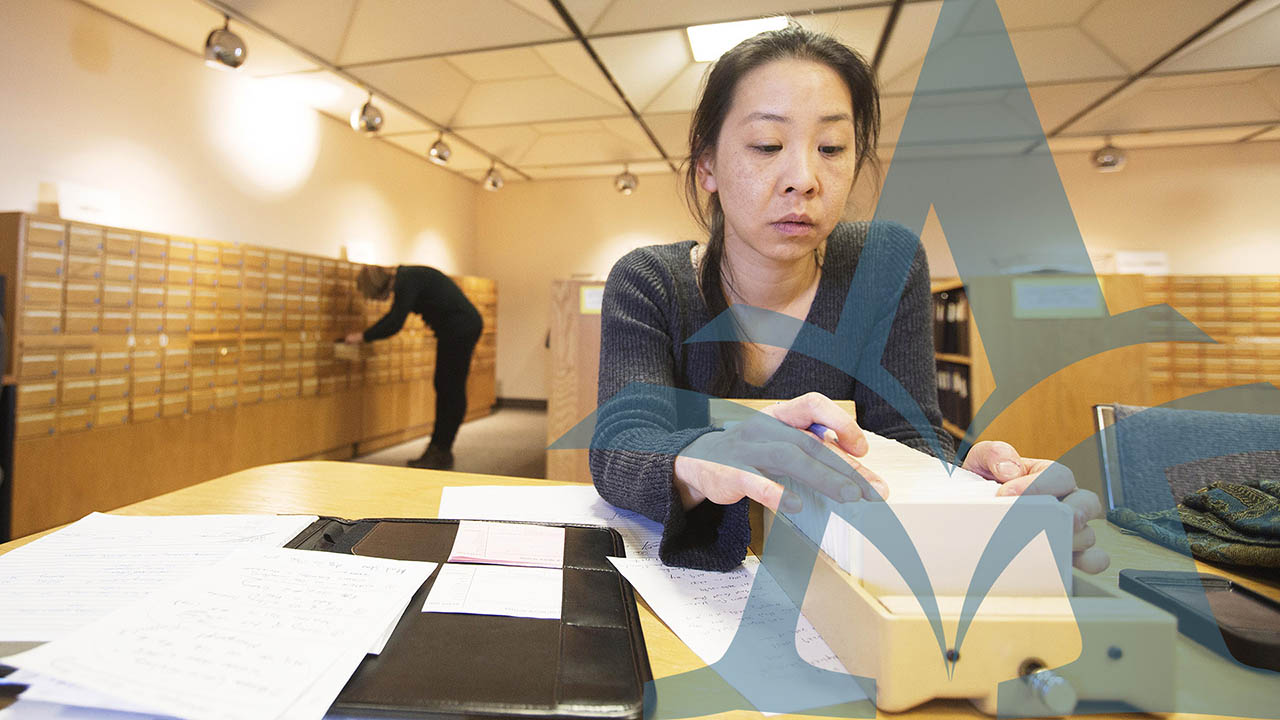
The research floor is located on the third floor of the Archives and provides access to all reference services. As a courtesy to other researchers, please refrain from unnecessary noise when consulting with staff or other researchers. Mobile phones should be set to silent or vibrate at all times. If necessary, please conduct your phone conversations in the area behind the elevators on the research floor.
Staff are available to assist researchers in completing request slips for the retrieval of original records or closed stack library items. Please note that retrieval of materials ceases 30 minutes prior to closing time and is limited on Wednesday evenings and Saturdays.
Researchers may only work with one box of original material or three files or items (e.g., maps, photographs) at any one time.
Access to or use of the following kinds of archival records may be delayed or restricted because of their physical condition: oversized items; fragile material; documentary art; special media (film and sound). Additionally, some materials, particularly Government Records may be governed by access restrictions or require review before release to a researcher. Every effort will be made to accommodate retrieval requests with limited delay. Nova Scotia Archives reserves the right to restrict retrieval of material previously available, based on the current physical condition of the records. All material must be returned 15 minutes prior to closing time.
Microform holdings include Nova Scotia Archives collections copied for preservation and copies of materials held elsewhere. Microfilm and microfiche readers are available in the research floor. Most microfilm is stored in numbered boxes on self-service shelving. Microfilm is shelved two-deep with even numbers on the outside. Original material available on microfilm will not be retrieved. Red bands on a microfilm box indicate that the contents may not be digitally saved or printed. You may make notes for personal research.
On busy days, researchers may be asked to restrict their use of microfilm machines to a 30-minute session. Equipment may be used only for microfilm held by the Nova Scotia Archives or ordered through the Nova Scotia Archives Inter-library Loan Service. Researchers may not bring in their own microfilm or microfilm obtained from other institutions.
When you are finished using microfilm, please rewind it and return it to the reference desk.
Researchers have access to:
In order to pre-book materials for use on Wednesday evening or Saturday, researchers must leave a request slip for the required material at the third floor reference desk before 3:00 pm Wednesday for Wednesday evening use and before 3:00 pm on Friday for Saturday use. Requests may also be submitted via e-mail at archivesnovascotia.ca or phone 902-424-6060. The full call number and/or reference code is required to pre-book material.
Reproduction and use of archival and library materials held by the Nova Scotia Archives are subject to Canadian copyright law, donor agreements, and the physical condition of the material. Researchers are responsible for all questions of copyright that may arise in the provision or use of reproductions. Please see Copying Services for further information on the copying services we provide and information regarding the use of Archives’ materials. No public photocopying facilities are available. Hand-held scanners and similar scanning devices are not permitted.
Nova Scotia Archives allows researchers, in consultation with staff, to photograph material from its holdings for the purpose of personal research. Any use of the digital copy for a purpose other than personal research will require authorization from the Nova Scotia Archives or, if copyright is not vested in the Archives, authorization from the copyright owner is required. Obtaining this copyright authorization is the responsibility of the researcher. Requests to photograph material will be reviewed by reference staff and permission will be based on condition, preservation restrictions and physical size of the material; copyright restrictions; and donor agreement restrictions. Materials must be handled carefully in accordance with the Archives’ care and handling guidelines. Cameras, smart phones, and tablets are permitted. The use of flash and/or lighting equipment, scanners, tripods, or video recorders is prohibited. Original material available on microfilm, our Beamish digital delivery tool, or our website will not be made available for researcher photography.
Archival material is unique and irreplaceable. Regrettably, people pose the most constant threat to archival material. In order to assist the Archives in the preservation and security of our archival holdings, you must observe the following rules:
banner image: Len Wagg - Wagg-7033 Nova Scotia Archives by Len Wagg
Nova Scotia Archives — https://archives.novascotia.ca/reference-research/
Crown copyright © 2026, Province of Nova Scotia.